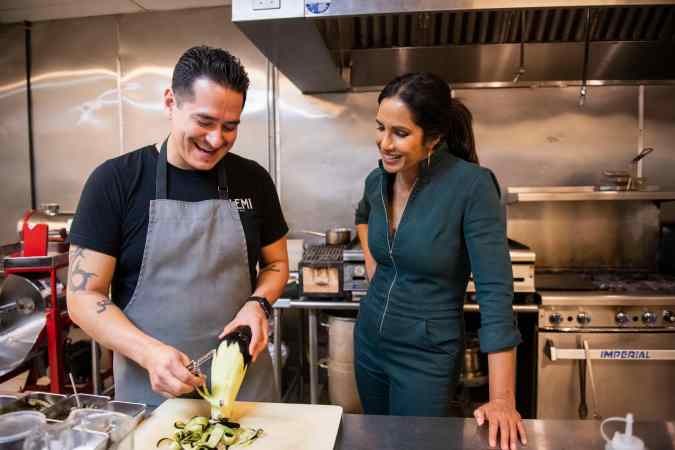That food is political is, in 2020, an uncontroversial statement. One need only look back at the Bon Appetit debacle that’s still unfolding to see firsthand that the way we think, talk, write and photograph food is inherently political, driven by biases both conscious and unconscious. To watch any number of food documentaries produced as of late (think of Ugly Delicious, Taco Chronicles, Salt, Fat, Acid, Heat and The Mind of a Chef) is to find chefs and food writers wanting to instill in their audiences the simple fact that to care about food requires caring about the people who cook it, about the culture it comes from and about the messy histories it calls up. But these forays into the lineage of tacos al pastor, the uses of soy sauce in Japanese cuisine or the key to New York City pizza teeter at the edge of a more radical proposition: to engage with other culinary cultures is a first step towards a more tolerant society.
One need only look at the first episode of Hulu’s Taste the Nation with Padma Lakshmi. The documentary series is framed around a set of questions Lakshmi poses to herself in the credits: “What is American food? And what makes us America?” The slippage from one question to the other gets at a growing trend of seeing food not merely as conduit to understand different cultures but as standing in for them.
Nailing what “American food” is will somehow lead us to understand what “America” is. Leaving aside the way such a moniker erases the continent it refers to, Lakshmi’s aim is a lofty and admirable one. And it’s driven by the conviction that our culinary biases and our political ones are intertwined. A fascinating case study lies in the way Mexican food continues to thrive in the U.S. while anti-immigrant sentiment continues to drive inhuman policies at the border. How could such a disconnect be possible?
Titled “Burritos at the Border” and set in the sister towns of El Paso and Juárez, the opening episode has Lakshmi having conversations with chefs, line-cooks and anthropologists that easily shuttle between what a burrito stands for (“a burrito is a tradition wrapped in colonization,” given its flour tortilla) and why it informs the current rhetoric surrounding the border. Its message is best summed up by Mixtli owner and chef Rico Torres: “I think that if we understand each other’s cuisines and cultures, and where those foods came from, I think that would be a way to open up doors.”

This is but a variation on the same argument that greeted Trump when he tweeted “Happy #CincoDeMayo! The best taco bowls are made in Trump Tower Grill. I love Hispanics!” back in 2016. Of course someone who thought taco bowls made in his own property were the height of what Mexican food could be would fail to think about Mexicans across the border as people worthy of being let into this country. A lack of culinary curiosity, the reasoning goes, is indicative of a provincial outlook.
Lakshmi’s show wants to make that same impassioned plea: if only people ate more authentic Mexican food, if only they knew more about the roots of the burrito, if only they came into contact with Mexican workers, maybe, just maybe, we’d find a way to not only soften the rhetoric around immigration at the border but we’d also find it in our hearts to truly grant our neighbors down South the dignity they deserve.

Only, Taste the Nation actually serves as a warning to the dangers of such optimistic messaging.

Torres’s chat with Lakshmi while the two cook together is full of quippy banter: “I think the most hardcore racist would enjoy any of these dishes,” Torres tells Lakshmi. “Yeah,” she replies, “Who doesn’t love a taco?” But it’s her conversation with H&H Car wash owner Maynard Haddad, who runs one of El Paso’s most recognizable local Mexican joints, that ends up showing how that kind of outlook is myopic and unhelpful.
Here is someone who immigrated to the U.S., who employs people who cross the border every day, who has a business built on the backs of Mexican workers, who voices his own displeasure at the rhetoric around the border and who crucially understands the plight many of his employees — someone who knows everything there is to know about burritos and the people who make them. And yet, without batting an eye, he openly admits to supporting Trump.
“He’s full of shit but I like him.” Haddad loves his workers but his commitment to conservatism trumps thinking about the real-life effects his policies have already had on his workforce.
Therein lies the limit of Taste the Nation‘s mission. As Emiliano Marentes, owner of Elemi, puts it in the episode, “It’s hard to think people are going to accept my tortillas before they accept my cousins.” Except, listening to Haddad shows us how easy it is for people to make that very choice.
Taste the Nation wants us all to resist that compartmentalization, to embrace the way food can be a gateway towards better understanding one another, while also showing us how much harder that is to put into practice.
Taste the Nation with Padma Lakshmi starts streaming on Hulu June 18, 2020.




